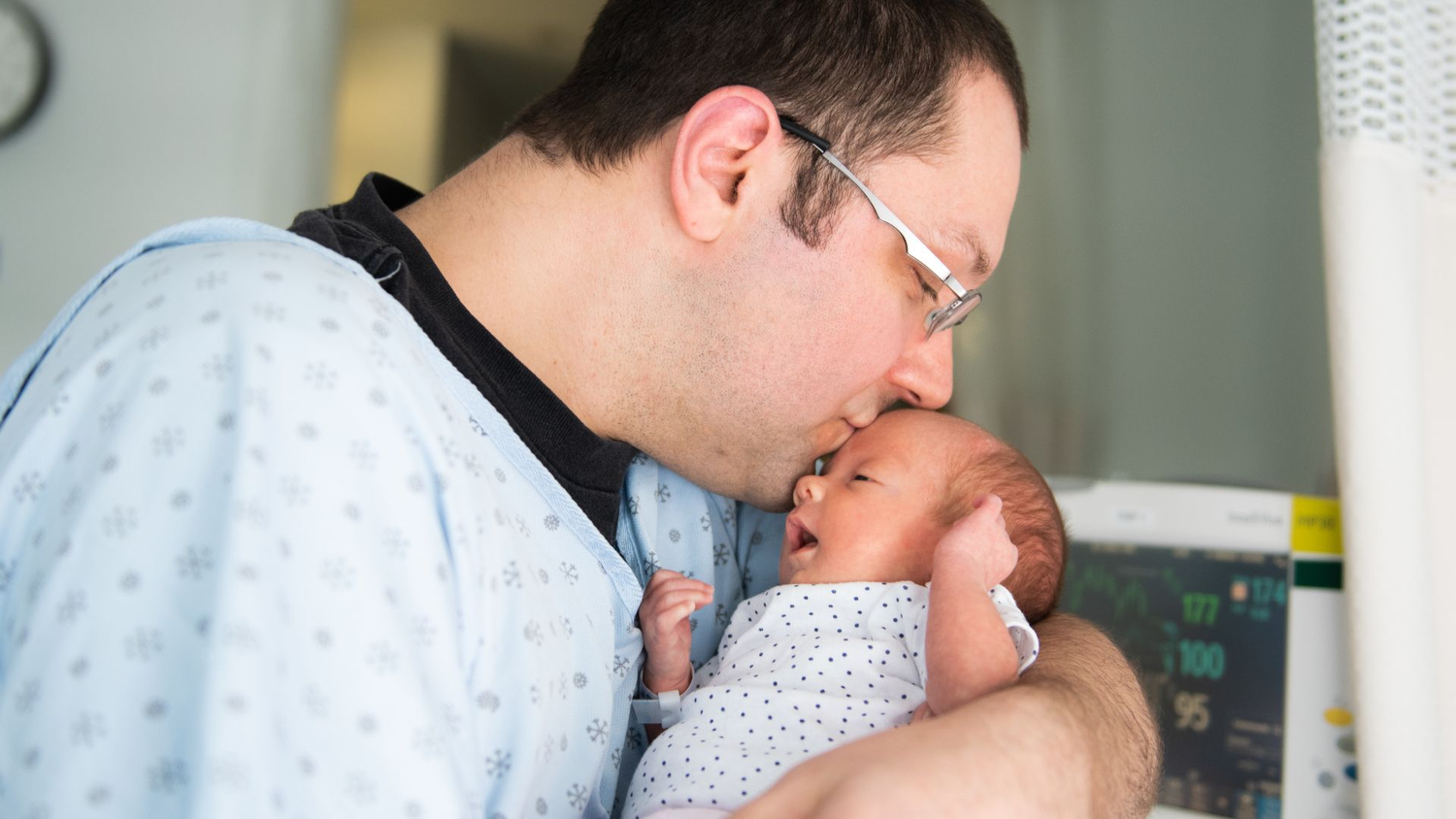The birth of a child is a joyful event that usually triggers great feelings of happiness and deep gratitude. However, if the baby is premature and dependent on intensive medical care, fears, insecurities and feelings of being overwhelmed overshadow happiness. While everything in the hospital initially revolves around caring for mother and child, many fathers of premature babies primarily try to show strength and be there for their partner and child. Of course, they also suffer from the situation and face major challenges.
Between helplessness and a sense of responsibility
When a premature baby is born, the circumstances of the birth are sometimes dramatic. The pregnancy usually ends abruptly and often with complications. From one moment to the next, two people become parents. However, they are not holding a proper baby with rosy cheeks in their arms. Rather, you are looking at a small human being who is supplied with tubes in the incubator and on tiny Preemie clothing is required. And while other parents take their children home shortly after birth, for parents of premature babies, a time of hope and fear often begins in the premature baby ward.
Depending on the child's condition, he or she may have to stay in the hospital for several weeks or even months. This time is very stressful for both parents, but they usually perceive it differently. Mothers of premature babies still have to recover in the first phase after birth and may need medical care themselves. Fathers therefore often try to be strong right from the start and to rationally process their own feelings such as fear and insecurity. They want to support their partner in the hospital and be there for their newborn. However, they are often not involved in the care of their child to the same extent as mothers. Therefore, they are more likely to take over everything organizational. They take care of formalities, collect information and organize everyday life at home. In addition, they often have to find ways to reconcile this exceptional situation with their professional obligations.
As this is not always easy, fathers of premature babies often feel under pressure. You want to function and live up to role expectations as a husband and father. At the same time, they are of course very concerned about their child's situation. Seeing your own child so fragile and fragile and hardly being able to do anything is a huge problem for most fathers. They experience great helplessness and emotional stress. Many fathers find it difficult to admit these feelings and talk about them with their partner or others. They mostly keep their worries and fears as well as their exhaustion to themselves because they believe they have to be strong for their family. In addition, friends and relatives usually only ask about the well-being of mother and child and automatically see the father as a rock in the surf.
Perceive stress and recognize stabilizing factors
For a long time, little attention was paid to how much fathers suffer from the challenges of a premature birth. But in recent years there has been a change in this regard. There are now several studies that show that the birth of a premature baby also causes great psychological stress for fathers. It has also been shown that the risk of (postpartum) depression increases in fathers after a premature birth. And it is now also known that anxiety disorders can occur more often in fathers of premature babies and sometimes persist for a long time after birth.
But how can you prevent this or reduce the psychological stress? Research has also been conducted on this question. It became clear that fathers in particular benefit from being more involved in the care of their child. This makes you feel less powerless and more able to cope with the situation. Against this background, fathers should actively demand greater involvement from hospital staff in the care of the premature baby. They should also insist on being informed about all developments, just like the mothers. Because this gives many fathers support and a feeling of control.
Support from family and friends has also been found to be an important factor for paternal stability. Especially with them, fathers of premature babies should have the opportunity to show weaknesses and express fears and worries. Of course, fathers also have the right not to always be strong and should therefore definitely accept help. If this is difficult for you among your friends or family, you can talk to other parents of premature babies. Be it through a self-help group or online. Other parents of premature babies can understand the situation better and may be able to give helpful tips from their own experience.
For fathers who primarily want to exchange ideas with other fathers, there has been a closed Facebook group for < for a few years now a data-mce-fragment="1" href="https://www.facebook.com/groups/fruehchenpapas/" data-mce-href="https://www.facebook.com/groups/fruehchenpapas/" >Preemie daddies , which many fathers of premature babies actively use. The founder of the Facebook group, Sebastian Behrens, who himself is the father of a premature baby, says: “< i data-mce-fragment="1">Back then, I didn't find a group in which premature dads exchange ideas. I then quickly founded one myself. Men usually find it difficult to open up. Here you are among yourself and an exchange helps a lot to process your own fears.“< span data-mce-fragment="1" data-ccp-props='{"201341983":0,"335559739":160,"335559740":259}'>
A lobby for fathers of premature babies
Fortunately, the challenges faced by fathers of premature babies have become more socially aware in recent years. The Federal Association 'The Premature Child', for example, draws attention to the situation of fathers of premature babies with a poster entitled “Fathers of premature babies can also breastfeed”. The aim of the poster is to raise awareness among fathers of premature babies and hospital staff regarding the postnatal involvement and support of fathers.
The association has also long been committed to ensuring that both the mother and the father are entitled to appropriate time off after the birth. Above all, in order to be able to meet the new challenges without direct professional and financial pressure.
And something actually happens in this area. Federal Minister for Family Affairs Lisa Paus has announced that the government will introduce two weeks of paternity leave in 2024 (for all fathers or the second parent). This should not be confused with parental leave, which fathers can also take. Rather, it is a 100 percent paid vacation that fathers are legally entitled to without prior application. This would mean relief for fathers and their families, which would enable fathers of premature babies in particular to go through the acute phase after the birth with less stress and to have more emotional reserves in the long term.
(Image credit: Manon Allard | Getty Images Signature)





